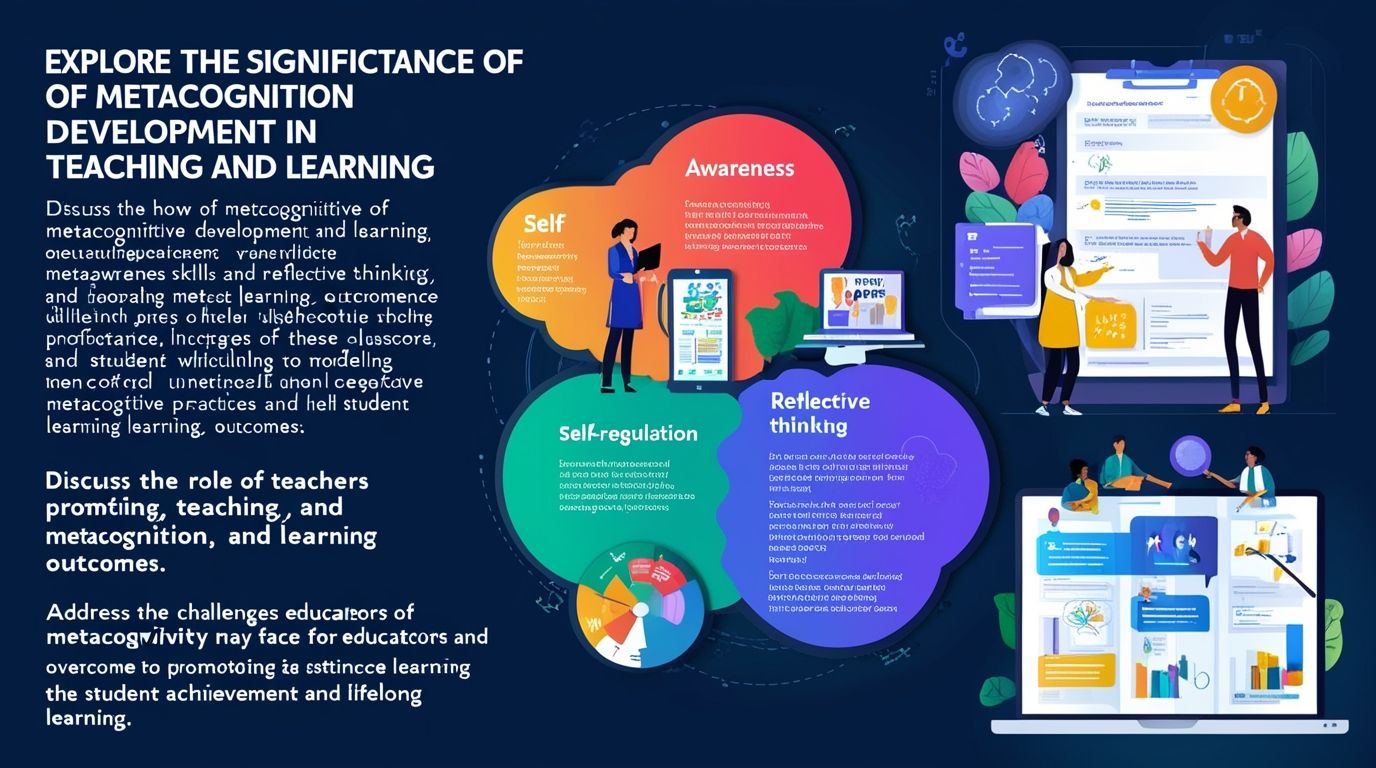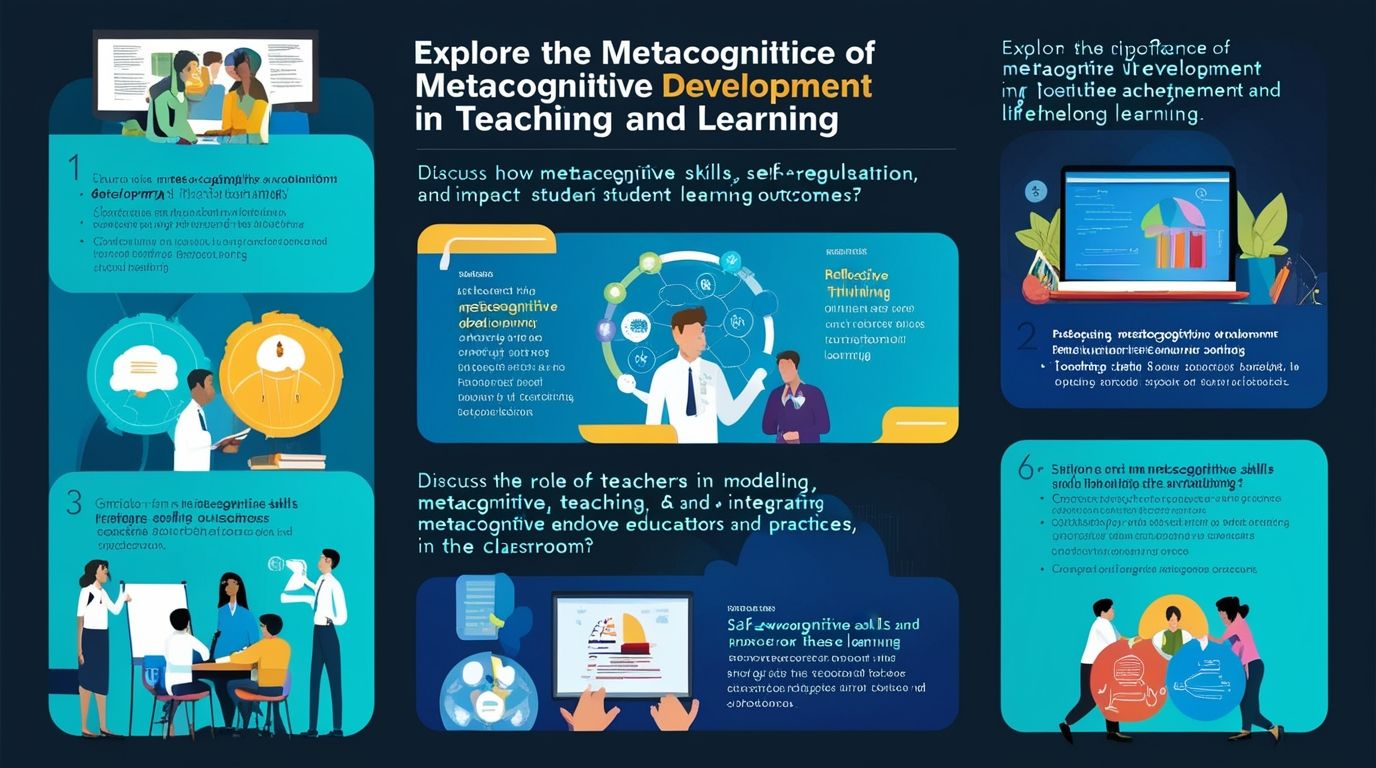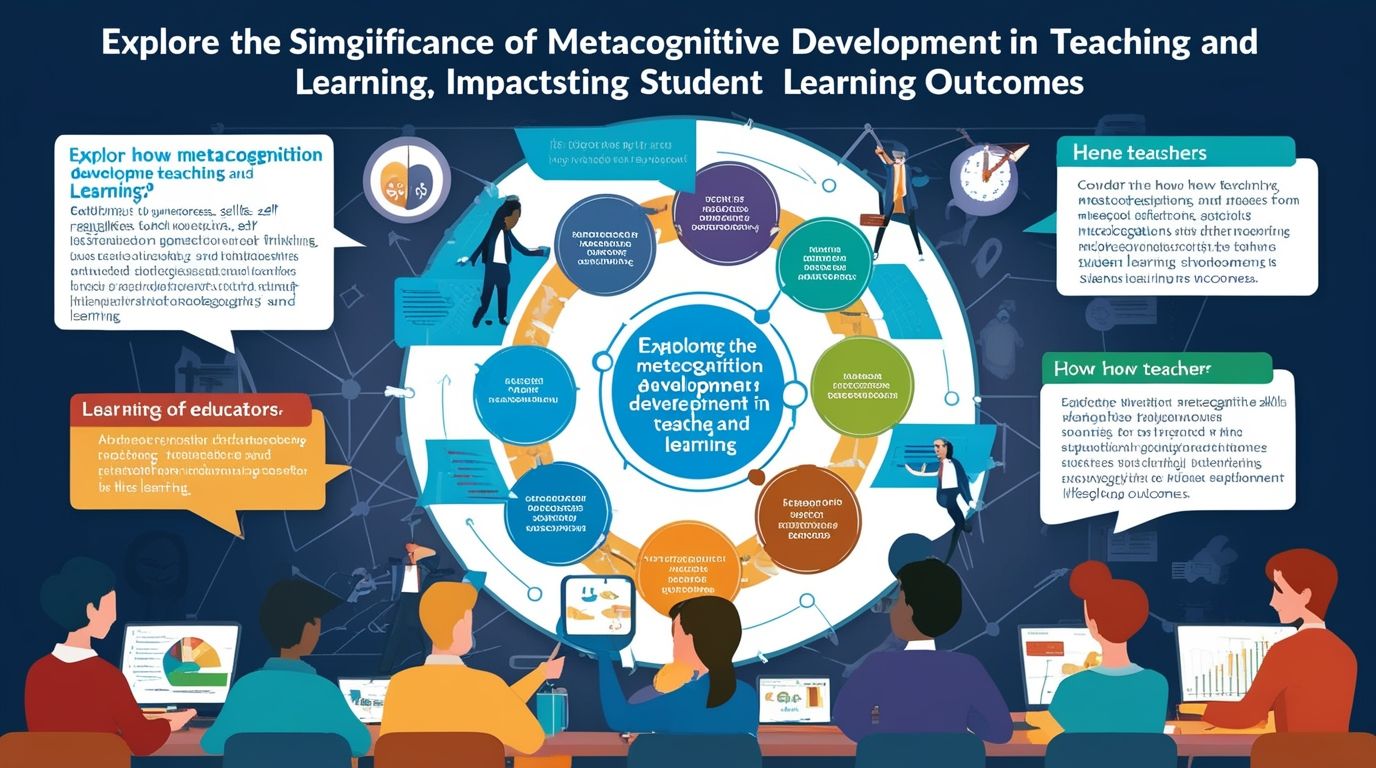Metacognition Development in Teaching and Learning Metacognition, often defined as “thinking about thinking,” is a crucial element in the teaching and learning process. It involves self-awareness and self-regulation of one’s cognitive processes, including planning, monitoring, and evaluating one’s understanding and performance. In the educational context, metacognition empowers both teachers and students to enhance learning outcomes by fostering a deeper understanding of how knowledge is acquired and applied. This article explores the importance of metacognition development in teaching and learning, its impact on educational outcomes, and strategies for cultivating metacognitive skills in the classroom.
1. Understanding Metacognition
Metacognition comprises two primary components: metacognitive knowledge and metacognitive regulation.
- Metacognitive Knowledge refers to an individual’s awareness of their cognitive processes. This includes understanding one’s learning preferences, recognizing the strategies that are most effective for learning, and being aware of the cognitive tasks at hand.
- Metacognitive Regulation involves the ability to manage and control cognitive processes through planning, monitoring, and evaluating one’s learning activities. This regulation ensures that learning is purposeful and directed towards specific goals.
Together, these components enable learners to become more independent and effective in their educational pursuits, as they can critically assess their learning strategies and make adjustments as needed.
2. The Importance of Metacognition in Learning
The development of metacognitive skills is essential for academic success. Students who engage in metacognitive practices are better equipped to understand their learning processes, which leads to improved problem-solving abilities, greater retention of information, and a more profound understanding of the material.
- 2.1 Enhancing Problem-Solving Skills Metacognition plays a vital role in enhancing problem-solving skills. When students are aware of their cognitive processes, they can approach problems more systematically. They can plan their approach, monitor their progress, and adjust their strategies if they encounter difficulties. This self-regulation allows them to overcome obstacles more effectively, leading to better outcomes in complex tasks.
- 2.2 Improving Retention and Understanding Metacognitive practices also improve information retention and understanding. By regularly reflecting on their learning, students can identify gaps in their knowledge and revisit material that they find challenging. This iterative process of reflection and adjustment helps solidify their understanding and ensures that they retain the information longer. Moreover, metacognition encourages deep learning, where students engage with the material at a conceptual level rather than merely memorizing facts.
- 2.3 Promoting Lifelong Learning Developing metacognitive skills also promotes lifelong learning. When students learn to regulate their cognitive processes, they become more autonomous learners. They can apply these skills in various contexts, both academic and non-academic, throughout their lives. This ability to learn independently is particularly important in today’s rapidly changing world, where continuous learning and adaptation are necessary for personal and professional growth.

3. The Role of Teachers in Developing Metacognition
Teachers play a critical role in fostering metacognitive development in students. By incorporating metacognitive strategies into their teaching practices, educators can help students become more self-aware and self-directed learners.
- 3.1 Modeling Metacognitive Strategies One of the most effective ways teachers can develop metacognition in students is by modeling metacognitive strategies themselves. Teachers can demonstrate how they plan, monitor, and evaluate their own thinking processes when approaching a problem or learning a new concept. For example, a teacher might verbalize their thought process while solving a math problem, explaining the steps they are taking and why. This modeling provides students with a concrete example of how to engage in metacognitive thinking and encourages them to adopt similar strategies.
- 3.2 Teaching Metacognitive Skills Explicitly In addition to modeling, teachers can explicitly teach metacognitive skills by integrating them into the curriculum. This can involve teaching students how to set goals, plan their learning activities, monitor their progress, and reflect on their learning experiences. For instance, before beginning a new unit, a teacher might guide students in setting specific learning goals and developing a plan to achieve them. Throughout the unit, the teacher can encourage students to monitor their progress and make adjustments as needed. At the end of the unit, students can reflect on their learning, evaluating what strategies worked well and what could be improved.
The Role of Teachers in Developing Metacognition
- 3.3 Creating a Metacognitive Classroom Environment Creating a classroom environment that encourages metacognitive thinking is also essential. Teachers can foster this environment by encouraging open dialogue about the learning process, asking reflective questions, and providing opportunities for students to self-assess their work. For example, after completing an assignment, a teacher might ask students to reflect on what strategies they used, what challenges they faced, and how they might approach a similar task differently in the future. This reflection helps students become more aware of their cognitive processes and encourages them to take ownership of their learning.
- 3.4 Incorporating Metacognitive Activities Incorporating metacognitive activities into the classroom can further support students in developing these skills. Activities such as journaling, self-assessment, peer feedback, and group discussions can provide students with opportunities to practice metacognitive thinking. For example, a teacher might ask students to keep a learning journal where they record their thoughts and reflections on their learning experiences. This journaling can help students become more aware of their cognitive processes and encourage them to think critically about their learning strategies.
4. The Impact of Metacognition on Educational Outcomes
The development of metacognitive skills has a significant impact on educational outcomes. Research has shown that students who engage in metacognitive practices tend to perform better academically, as they are more likely to employ effective learning strategies, manage their time efficiently, and persist through challenges.
- 4.1 Academic Achievement Students who develop strong metacognitive skills are more likely to achieve higher academic success. This is because metacognition enables them to take control of their learning, identify areas where they need to improve, and make necessary adjustments. By being aware of their cognitive processes, students can optimize their study habits, leading to better performance on assessments and assignments.
- 4.2 Increased Motivation and Confidence Metacognitive development also leads to increased motivation and confidence in students. When students have a clear understanding of how they learn and can see the progress they are making, they are more likely to feel motivated to continue their efforts. Additionally, as they become more proficient in self-regulating their learning, they gain confidence in their ability to succeed academically. This increased motivation and confidence can have a positive ripple effect, leading to further academic success and personal growth.
- 4.3 Improved Resilience and Adaptability Metacognition also contributes to improved resilience and adaptability. Students who are skilled in metacognitive thinking are better equipped to handle setbacks and challenges. They can assess the situation, identify what went wrong, and develop a plan to overcome the obstacle. This ability to adapt and persevere in the face of challenges is critical for success in both academic and non-academic pursuits.

5. Challenges in Developing Metacognition
While the benefits of metacognition are clear, there are challenges in developing these skills in students. These challenges include:
- Student Resistance: Some students may resist engaging in metacognitive practices, either because they find them difficult or because they are accustomed to more passive learning approaches.
- Time Constraints: Incorporating metacognitive activities into the curriculum requires time, which can be challenging given the demands of covering academic content.
- Lack of Awareness: Both teachers and students may lack awareness of metacognitive strategies and how to implement them effectively.
Addressing these challenges requires a concerted effort from educators and institutions. Providing professional development opportunities for teachers, raising awareness of the importance of metacognition, and gradually integrating metacognitive practices into the curriculum can help overcome these obstacles.
6. Conclusion
In conclusion, the development of metacognition in teaching and learning is essential for academic success and lifelong learning. Metacognitive skills enable students to become self-aware, self-regulated learners who can critically assess their learning processes and make necessary adjustments. Teachers play a crucial role in fostering metacognition by modeling metacognitive strategies, teaching these skills explicitly, and creating a classroom environment that encourages reflective thinking. While there are challenges in developing metacognition, the benefits far outweigh the difficulties. By prioritizing metacognitive development, educators can help students achieve greater academic success, increase their motivation and confidence, and prepare them for the demands of an ever-changing world.

6 thoughts on “Metacognition Development in Teaching and Learning”
Comments are closed.